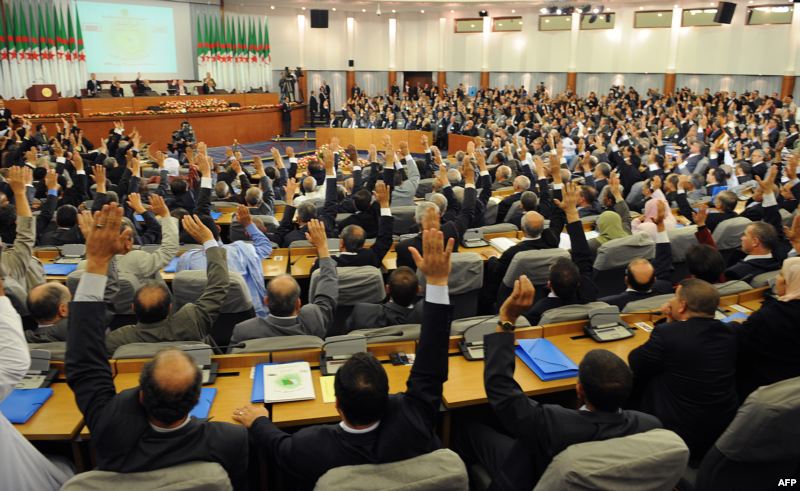نطاق مساهمة المعارضة البرلمانية في التشريع والرقابة عليه : دراسة في الدستور الجزائري مقارنة بالدستور المغربي
Parliamentary opposition and authority of legislation : A study in the Algerian Constitution as compared to the Moroccan constitution

اعداد : د. حبشي لزرق – أستاذ القانون العام، كلية الحقوق والعلوم السياسية – جامعة عبد الرحمان ابن خلدون، تيارت، الجزائر
- المركز الديمقراطي العربي –
- مجلة القانون الدستوري والعلوم الإدارية : العدد الثالث أيار – مايو 2019، وهي مجلة دولية محكمة تصدر عن المركز الديمقراطي العربي المانيا- برلين.
- تعنى المجلة في مجال الدراسات والبحوث والأوراق البحثية في مجالات الدراسات الدستورية والعلوم الإدارية المقارنة – نشر البحوث في اللغات ( العربية – الفرنسية – الإنجليزية )
للأطلاع على البحث “pdf” من خلال الرابط المرفق :-
ملخص:
اقتضت الديمقراطية في بدايات تكريسها عبر مختلف الأزمنة وفي تطور مرحلي لها مشاركة الغالبية من الشعب في شؤون الحكم بآليات تحقق ذلك بشكل أو بآخر. حينها اتجه السعي من طرف الأنظمة السياسية في العالم إلىما يعرف بالتمثيل الشعبي والسبب يرجع هنالك إلى استحالة طريق المشاركة المباشرة في تلك الشؤون.
عندئذ وجدت سلطة التشريع في الدول تنوب عن الشعب في عملية صنع القرار السياسي، وكذا ذلك بحق وضع الديمقراطية كفكرة سياسية موضع التطبيق والتنفيذ عن طريق ما هو مخول دستوريا للبرلمان من اختصاصات تتعلق بسن القوانين المنظمة لمختلف نواحي الحياة داخل الدولة. وإذا كان السعي مستمرا دائما في بلوغ مستويات معتبرة في التحول بالديمقراطية من مجرد أفكار، إلى واقع حقيقي ملموس، وخاصة في ظل التطورات والمستجدات السياسية دوليا على وجه الخصوص، برزت مظاهر أخرى لذلك، تبنتها الأنظمة الدستورية المختلفة وبشكل خاص بعض الأنظمة الدستورية العربية كالجزائر والمملكة المغربية، أخذت شكل ما يعرف بالمعارضة البرلمانية والاعتراف الدستوري الصريح بدورها من خلال المساهمة في العملية التشريعية، وحتى المشاركة في تقويمها وتقييمها بآلية تحريك الرقابة الدستورية عليها. ومن ثم يعد ذلك الاعتراف الدستوري سواء في الجزائر، أو في المغرب بمثابة القفزة النوعية في إدراك أسمى وأعلى مستويات الديمقراطية الفعلية الحقيقية، بعدما خلت الدساتير السابقة من ذلك الاقرار الدستوري وبتلك الصراحة من دور المعارضة البرلمانية.
فالحقيقية الآن مفادها شيء محدد وهو تحول دور المعارضة البرلمانية من مجرد الاحتمال بمساهمتها في العمل التشريعي إلى التأكيد وبشكل قاطع بمشاركتها المضمونة دستوريا في صنع السياسات العامة للدولة، لاسيما في ظل التزايد للدور الواسع الذي تلعبه منظمات المجتمع المدني، من خلال علاقتها التكاملية والتفاعلية مع السياسة العامة للدولة وخصوصا من الناحية الاجتماعية. والنتيجة المتوقعة حينذاك لا محالة هي سيادة القانون المعبر في الكثير من جزئياته عن ما يبتغيه المواطن ويرتضيه، أو على الأقل ضمان عدم امتعاضه حيال السياسات العامة، وفق ما تقتضيه مبادئ المواطنة القائمة على شعور المواطن وارتباطه الوثيق بسلطته الحاكمة ودعمها، وهنالك تكمن قوة الدول وتماسكها.
Abstrat:
Democratic at the beginning of its dedication through various times and in a progressive development has necessitated the participation of the majority of the people in governance, mechanisms that have been achieved in one form or another. The quest of the world’s political systems has tended to be known as popular representation, and the reason is that there is no way to participate directly in those matters.
The power of legislation in states was then found to be the responsibility of the people in the political decision-making process, as well as the right to put democratic as a political idea and to implement it through what is constitutionally empowered for Parliament to enact laws governing various aspects of life within the state. While the pursuit of significant levels of democratization has always been pursued from mere ideas to real reality, especially in the light of international political developments and events in particular, there have been other manifestations, adopted by the various constitutional regimes and, in particular, some constitutional regimes Arabic, such as Algeria and the Kingdom of Morocco, The qualitative leap in the realization of the highest and most true levels of real democratic, after the previous constitutions did not make that constitutional declaration, and that frankness of the role of the parliamentary opposition.
The real thing now is that the role of the parliamentary opposition is shifted from the mere prospect of its contribution to the legislative work to a categorical affirmation of its constitutionally guaranteed participation in the public policymaking of the State, especially in view of the increasing role played by civil society organizations, through Their complementary and interactive relationship with the state’s public policy, especially in social terms. The expected result is inevitably the rule of law, which in many of its parts reflects what the citizen seeks and accepts, or at least to ensure that he is not resentful of public policies, as required by the principles of citizenship, based on a citizen’s sense and his close association with and support for his governing power, and there lies Strength and cohesion of States.




